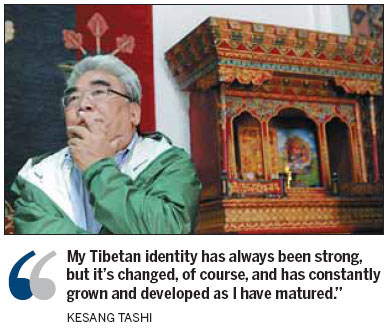Duo find new lives, homes a world apart
"The great Buddhist tradition came from India. The Tibetans were so devout and incorporated Buddhism into their daily lives. In that sense, they are good at importing, interpreting and transforming outside influences into new ideas."
It was also during one of his 80-odd trips between the US and Tibet that he met his wife, Tsedan, 44, who is no "ordinary" Tibetan.
In 1996, she became the first Tibetan woman to be awarded a doctorate, when her thesis on alpine physiology was accepted by the Chinese Academy of Sciences.
Following three years of research back in Lhasa, she undertook post-doctoral work at the medical center at Columbia University in New York. Her time in the US gave her an opportunity to rediscover, and reflect on, her own culture.
"I struggled at first. Even though I was well educated in science, I couldn't speak English very well. I asked, 'Who I am, what I am doing here?' But gradually, I found my own culture and Buddhist philosophy certainly helped," she said.
"Working in an international lab made me realize that Tibetan people come across really well. If you have knowledge, you don't have to show off. Like the Chinese saying, 'If you are a real pearl, you will shine one day'. That modestly helps to unite people and helps them work together."
As a Tibetan who has lived in the US for almost half a century Tashi feels as though he has a foot in both camps.
"Even though I live in the States, sometimes I am still an outsider. People take American culture for granted and that distance means I can sometimes point things out more clearly and analytically. As a man from the border, I've been an observer, like an anthropologist, all my life."
Since 2007, Tashi has been actively engaged in fostering educational exchanges and establishing relationships between educators and community leaders in Shangri-La and in Hanover, New Hampshire, where he now lives.
This summer, his daughter, 16, and son, 15, together with a number of other teenagers from Hanover, studied Chinese in Gyalthang for a month as part of an exchange program.
Tashi is also occasionally invited to deliver lectures on Tibet at Dartmouth. "The best story is an unbiased one with no agenda, presented by some one with an in-depth understanding of Tibetan culture and who knows the minds of the audience. And I try to do that," said Tashi. He is currently working on a book entitled A Bridge to Shangri-La, which focuses on three generations of his family at the crossroads of political and social change.
"In a way, I'm the living embodiment of Tibetan culture, with one foot in the 19th century and even earlier, and one in the 21st century. I try to portray a realistic picture by using the monastic side and the business side," he said.
Contact the writer at [email protected]
Registration Number: 130349




























